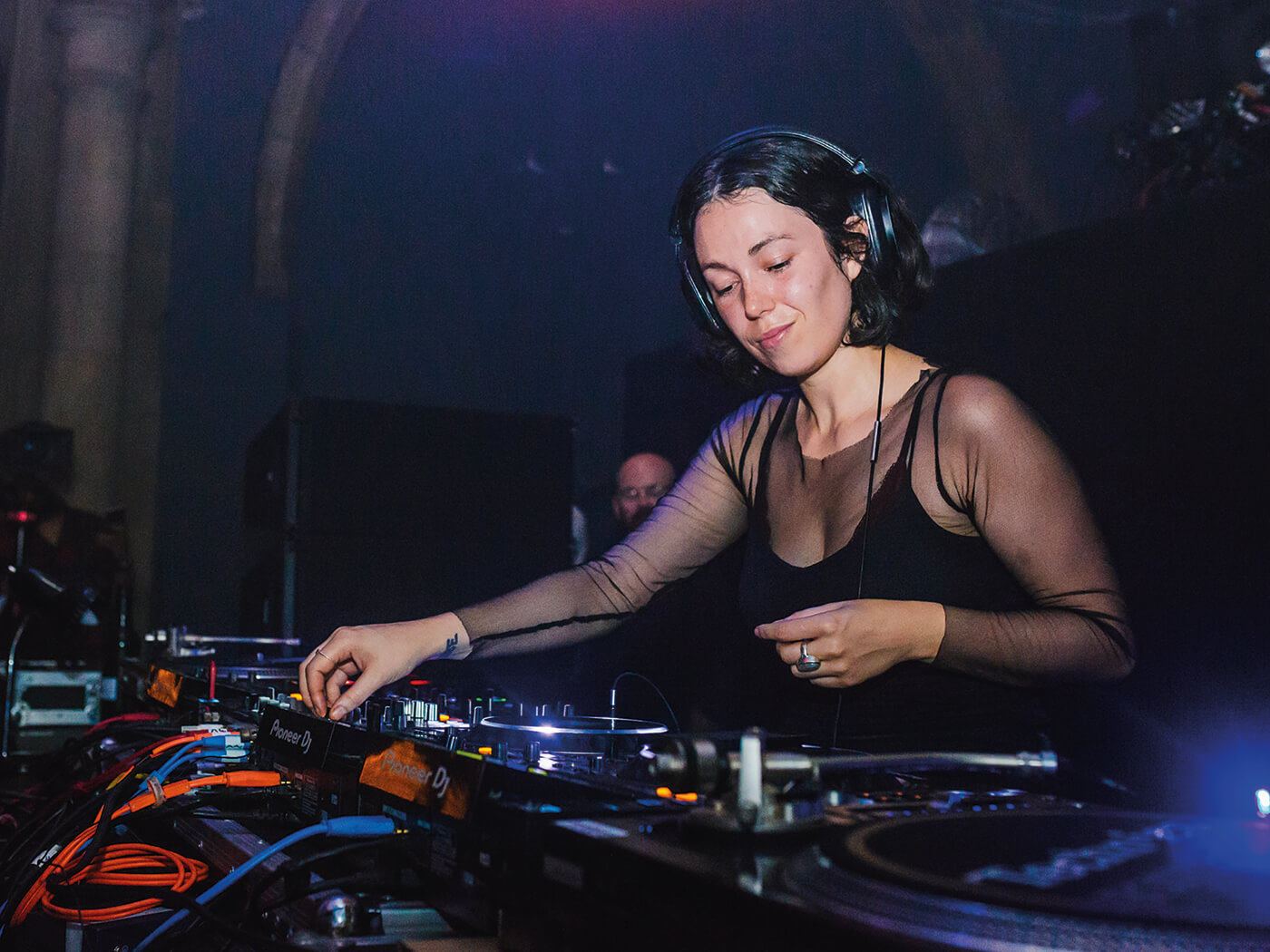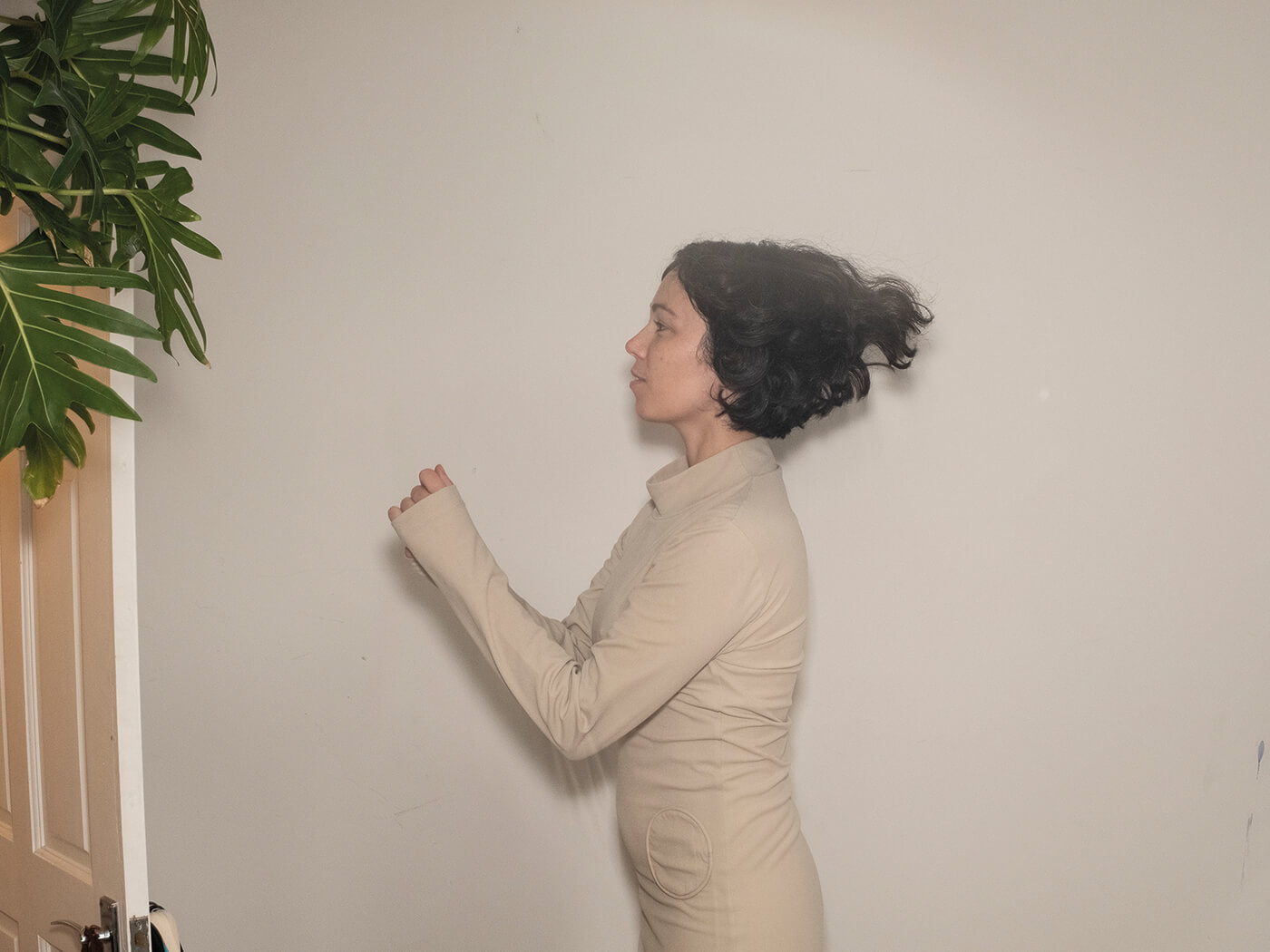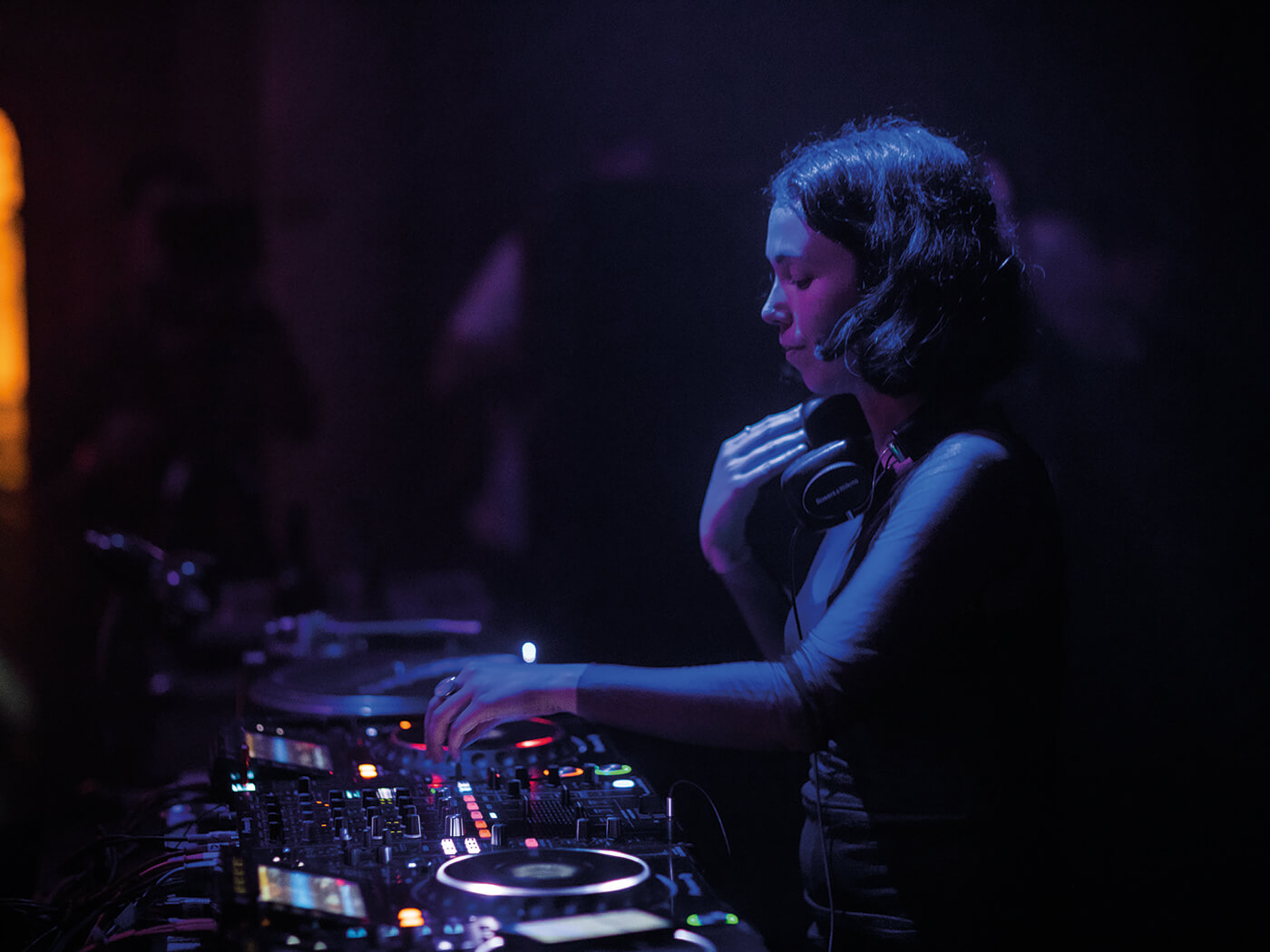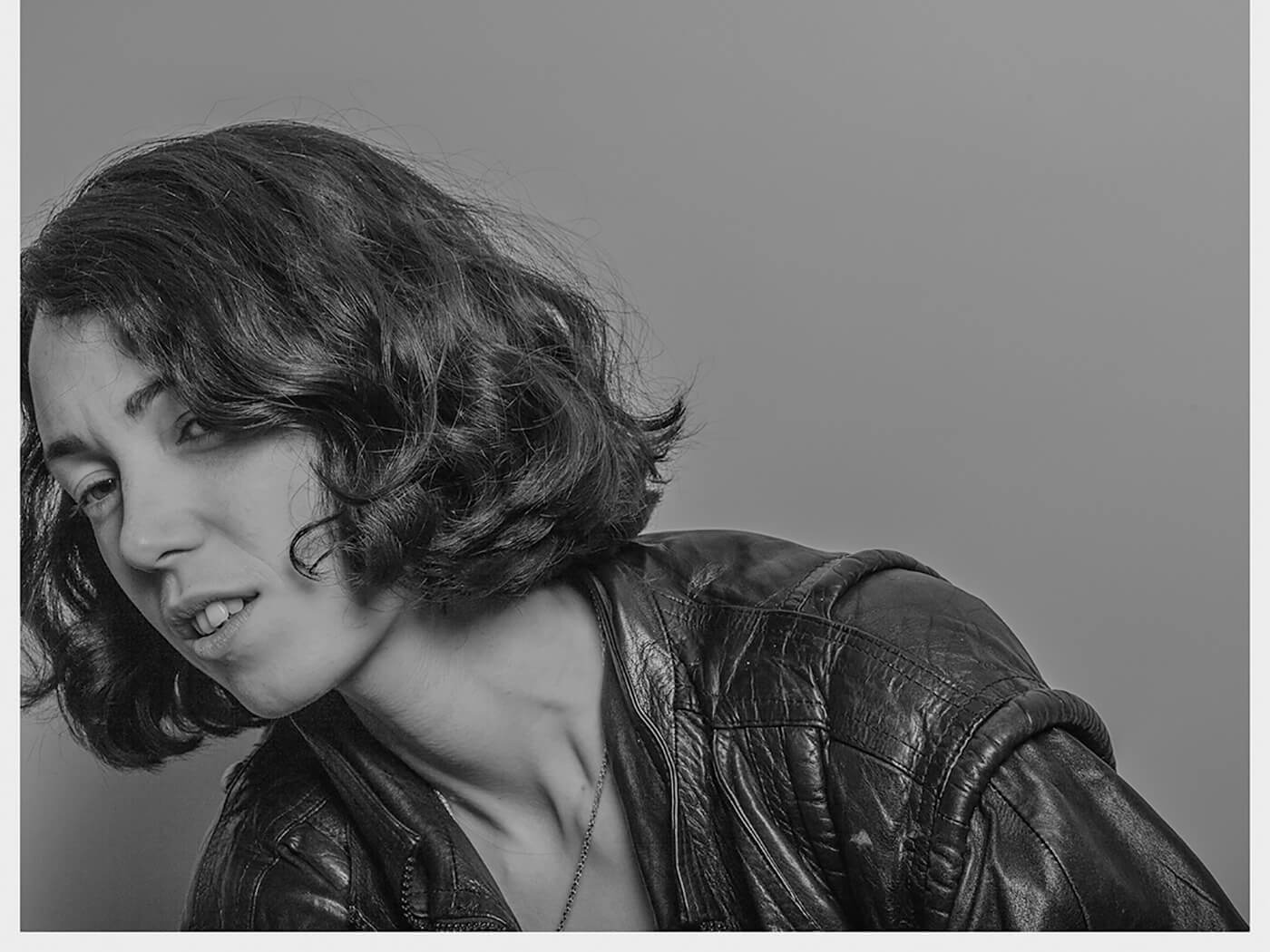Kelly Lee Owens on composing eclectic techno-pop, DJ’ing and harnessing your gear
As Kelly Lee Owens prepares to release her sophomore album Inner Song, she tells us about her roundabout route to music-making and the excitement she finds in the glitches between machines and their users.

Image: George Harrison
“Many of my patients encouraged me to pursue music when I worked at Christie’s Cancer Hospital in Manchester,” says Kelly Lee Owens. “Hearing perspectives from people coming to the end of their lives really made me reconsider what was important.”
Shapeshifting electronic musician and songwriter Kelly Lee Owens’ life was very different before she immersed herself in the hardware and wires of the studio. Formerly a nurse, it’s clear from her startlingly accomplished 2017 debut and last year’s euphoric Luminous Spaces/Luminous Beings – a collaboration with fellow sonic traveller Jon Hopkins – that her career pivot from medicine to techno has paid off. “The hospital was an amazing place to work,” she says. “But when I was taking paid leave, I’d fill the time by helping out bands and working at festivals, making sure I was as involved in music as I could be. A lot of the patients I worked with said to me, ‘If you love music, why don’t you go and do it?’ so I took their advice.”
Her much-anticipated sophomore album Inner Song, set to be unveiled in August – its May release has been postponed due to the COVID-19 crisis – is a testament to the potential encouraged by her patients. Kelly’s shadowy sound may sport a liquid-cool demeanour but beneath it lies a beating heart that smudges the lines between the dancefloor and dream-pop. “I like to leave the mistakes in there,” she says of her approach to music making. “You can probably hear it on the record when, at certain moments, it gets quite wonky. But I love that. It just makes music seem more real. We’re humans. We’re not perfect but neither are our machines. Let’s just work together and try and make the best of it.”

Purer grooves
Born in Wales, Kelly’s musical journey has taken in moves to Manchester and London, and her musical passions have evolved alongside her career and ambitions. While her record collection has grown over the years from breezy indie guitars to hard-thumping techno, the connective tissue that binds them is readily apparent in her own music: melody. “It’s a huge thing,” she says. “Wales is obviously known as this melancholy land of song, and it’s definitely affected me. I don’t seem capable of writing a song in a major key.” From rural Welsh landscapes to London’s concrete jungle, the varied environments in which Kelly has lived have had an enormous impact on her musical stylings.
“I was talking to Barcelona-based producer John Talabot about this. The name of his label, Hivern, means winter. It turns out that no-one makes records there in the summer. That surely shapes what comes out of you.”
As well as immersing herself in music scenes across the country, Kelly’s palette was also broadened by the time she spent behind the counter of important music retailers. Her employment at the legendary Pure Groove when she first moved to the capital proved to be a crucial step in her development. “The Farringdon shop was where I first met Daniel Avery,” she says. “Then I met Erol Alkan and mavericks like Andrew Weatherall. I ended up becoming friends with these people and was lucky enough to call them mentors and collaborators.”
Surrounded by inspiration, both in person and from the shop’s speakers, sparked a transition in Kelly. She would go from selling records to making them. “My songs are an amalgamation of the places and people I’ve connected to,” she says. “Everything I’ve been exposed to has seeped in.”
https://www.instagram.com/p/CAcjmEXHt3Q/
Forming the bonds
Kelly’s first forays into music-making were fuelled by the analogue synthesizers of Phantasy artists Daniel Avery and James Greenwood. Kelly contributed vocals to the former’s 2013 breakout club banger Drone Logic and has forged a close-knit bond with the latter – who releases experimental electronica under the alias Ghost Culture – that continues to flower today.
Without a traditional upbringing in songwriting or performance, Kelly was powered by raw enthusiasm, learning to weave together songs using her listening skills and intuition. “I can’t read or write music, which some might see as limiting,” she says. “But when I first entered the studio, I just loved it. It wasn’t until then that I realised that music equipment and analogue synths are so physical. It’s so much fun to hook different things up and tweak the machines.”
Like many self-confessed non-musicians, technology enabled Kelly’s ideas and ambitions to take flight – and fly they do. Listen to the sunlit ambience of S.O or the unsteady vocal harmonies of Anxi and you’ll get a sense of the strangely inviting and meditative musical worlds that Kelly’s able to craft. Tracks such as the recent Melt, which samples the sounds of an iceberg collapsing, are a surefire sign that her talents and creativity are still expanding.
Unsurprisingly, Kelly doesn’t believe that the use of computers or hardware should make music any less heart-stopping than electronica’s purely organic equivalents. “Some say dance music is too cold, that there’s too much technology involved, but I disagree,” she says. “Your programs and gear are tools to help you express yourself, whether it’s Logic or a synthesizer, and on the other end of them is a human operator.”

Creative outbursts
Kelly’s creativity is driven by her love of sampling, and she’s carving out a reputation as someone unafraid of wrapping her recording equipment around even the most unlikely sound sources. “I sample all sorts of weird stuff,” she says, with a laugh. “This is going to sound odd but my nan’s hearing aid whistles a lot. When she took it out, it made this really high-pitch sound, so I recorded and processed it. You can sometimes create magical moments from the most unexpected places.”
As with so many young musicians today, the world around us makes up another of Kelly’s most significant influences. Melt, the lead track from forthcoming LP Inner Song, uses the disintegration of an iceberg to sculpt lithe musical movements, and is a comment on the literal collapse of the natural order – albeit one you can rave to. “I found the sample online rather than hiking up to the arctic circle to record it myself,” she says. “But nature certainly has a profound impact on our sonic world, offering plenty of gems. I’m obsessed with everyday sounds and effects.”
When preparing to record, Kelly sets up her environment in a way that allows for maximum experimentation, so she can get the most out of her creative outbursts. “I’ll hook up a synth like a Korg Mono/Poly to some kind of sequencer just to see what happens,” she says. “Sometimes a random pattern will emerge that just works, especially with analogue, where you can’t predict anything. When I worked with Jon Hopkins, he’d recently collaborated closely with Brian Eno. Brian told him there’s no such thing as a mistake and I agree. You have to look out for these moments, as these are the gems you didn’t even know you needed.”

Inner Song
The upcoming Inner Song follows a hectic period of international touring and DJ’ing in the wake of the unexpected success of her debut. As word of the album’s quality spread, Kelly received a steady stream of offers she couldn’t refuse. “All this playing live and DJ’ing certainly informed some moments on the record,” she says. “I couldn’t help but think about how it would come across live or how certain tracks would be received when I DJ’ed.”
The record represents a creative rebirth of sorts after going through what she describes as “a tough time”. The album opener and first piece of music she recorded is a disarming cover of Radiohead’s Weird Fishes/Arpeggi. “I love Radiohead and always wanted to do a version of this so it was a total blast for me,” says Kelly. “I was going to do a take with me singing on it but I realise I’m no Thom Yorke so it had to be an instrumental. It’s a bit like if Thom Yorke did his own solo cover of it rather than with the full band.”
The track came a year before Kelly was finally able to hunker down and invest some time into creating the material that would form the rest of the record. During its intensive month-long production, she was again able to connect with James Greenwood. “We really get on as a musical team. James is brilliant on Logic, and my ideas come so quickly that I need someone to assist with them as I move onto the next one. Ultimately though, I’m almost like an executive producer. Nothing gets put down unless I love it because I’m such a control freak.”
Combining almost meditative states with tougher, leaner grooves, the new album features plenty of highlights. But is there a standout she’s particularly satisfied with? “On is a song I really love. It was originally called The Spirit Of Keith as it was made on the day that Keith Flint passed away, as a tribute. It started out really simple before becoming this epic emotional track. I like how I was able to take something quite painful and translate it into something hopeful. But each track has its own world and life.”
Recording went down in Daniel Avery’s studio and James’s setup in the seaside town of Margate. Kelly opted to record all her own vocals alone. “I cannot have anyone else in the room when I’m singing. I just like to record them all myself in my own little cave,” she says. “I could never stand to sing in a pro studio. I had to do it once with [Velvet Underground legend] John Cale and that was terrifying. I almost had a heart attack when I saw that the vocal booth was the size of my house. Then when I started singing, he stood up and put his hands up. I thought he wanted me to stop – but he was loving it! I’d only put myself through something so intimidating for John Cale.”
Machine language
With a focus on robust ideas rather than shiny gadgetry, Kelly’s attitude to equipment and music technology is one of function, not fashion. “It definitely worked, experimenting with various synths to find the ones I connected with,” she says. “I started making music when I was in my mid-twenties so I had a pretty good idea of the kinds of sounds I wanted to come up with.” Like many others moving left of centre within electronics, she’s a believer in setting musical boundaries to extract the most adrenaline-pinching excitement from your gear. “You don’t need tonnes of equipment. You just need to try and find gear you have a genuine connection with. Otherwise it’s like having too many sweets in a sweetshop.”
Kelly certainly doesn’t feel obliged to keep up with the latest gear, and instead remains loyal to the knowledge of what will best translate her ideas into music. “The Korg Mono/Poly is my best friend, it’s been all over my records,” she says. “But the Korg MS-20 is something I can’t get away from. We used a Roland SH-101 for a lot of the basslines, alongside a lot of plug-ins from the likes of Crystalizer.”

Little tricks
Kelly is keen to reconfigure notions of what producers should be in 2020. With so much easily available and affordable gear on the market, these days there are innumerable avenues down which music-makers can take their creations. Though a fundamental understanding of the machinations of programs such as Pro Tools and Logic is likely to help, complete technical proficiency shouldn’t be anybody’s end goal. “Many people think producers are technical wizards but you don’t need to be to come up with great music,” says Kelly. “There are so many ways to get music made and finished. It all depends on the kind of producer you are.”
Kelly’s music is peppered with off-kilter attributes designed to seize the listener’s attention and not let go. “I love the details,” she says. “I use little tricks to keep tracks interesting, such as jarring beats so the brain doesn’t get bored or catch up with what it’s hearing. If you’re struggling to finish, go in on the details until you feel like you can’t do any more.” While putting in the hours to bring nascent ideas to fruition is important, Kelly is also a champion of downtime, and believes that giving artists the space to remain fluid and let their ideas move around them can make for expressive and sensational results.
“If you’re putting lots of effort into a track and it’s not happening, leave it and come back to it later. There’s nothing to be gained from locking yourself in a studio and not eating until something’s finished.”
Kelly also feels that artists shouldn’t compete to see who can spend the longest finessing their music. For her, the best moments never come from grinding through a track’s difficult birth period. “You can’t let yourself think that if you’ve only done four hours today, you’re not as valid as people who are putting out records right now,” she says. “The amount of time you’ve invested doesn’t necessarily mean it’s going to be good. You need to have balance between work and play, and respect your needs as a creator.”
Outside Kelly’s solo material, she’s also delved into the world of remixes and collaborations, applying her sheen to Björk’s Arisen My Senses and St Vincent’s New York – and thoroughly enjoying the freedoms given to her by these two high-profile masterminds in helping to splice and dice their songs. “In a sense, every song has 90 lives and I love exploring them through remixes,” says Kelly.
“I found it easy compared to my own material. Instead of thinking about what kick drum you’re going to use, all the track’s foundations are there, you just need to add to them. It’s fun to turn people’s perceptions of what an artist sounds like upside down. For St Vincent, I did a techno banger and she loved it because it’s not the world she’s from.”
Kelly’s 2019 collaboration with Hopkins, Luminous Spaces/Luminous Beings, also helped raise her profile, though she still believes it undersold her talents in the minds of music fans. “It was great but also really frustrating, as I think some people thought I was only featuring on the release. But me and Jon were creative equals and worked on a track each for the release. It was disappointing that my contribution was not fully recognised.”

Smalltown supersound
If there were any doubts about Kelly’s abilities, the August arrival of Inner Song should put them to rest and cement her standing as a potent force with a knack for powerful long-lasting melodies and an ability to bottle and recontextualise club, pop and after-hours ambience. The album will be put out by Smalltown Supersound, the massively respected Norwegian independent label responsible for similarly stellar releases such as Todd Terje’s Inspector Norse.
“They’ve been brilliant. Joakim [Haugland, the label’s founder] gives me all the freedom I want – I just deliver the music and he puts it out, and that’s the perfect relationship for an artist like me,” says Kelly. Though the album’s release has pushed, Smalltown Supersound promises a gorgeous limited vinyl pressing. For an audio aficionado like Kelly, only the best will do.
“It goes through all these mastering and mixing processes,” she says. “So to not have it sound good on vinyl would be devastating. I have a lot of bass frequencies on there, so what my music needs is space. It’s no good squashing music into a limited amount of grooves.”
Speaking just as the UK is put on lockdown, all Kelly’s dates and DJ sets have been put on hold for now. But, like her emotive music, she’s cautiously optimistic about the future. “I just hope everyone uses this time to be creative and reflective, and keeps each other safe. I think there’s light at the end of the tunnel – it might just take a bit of time to get there.”
Inner Song will be available on Smalltown Supersound on 28 August. Visit kellyleeowens.com for more information.
Read more artist interviews here.